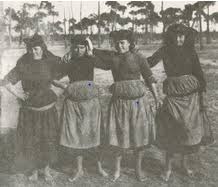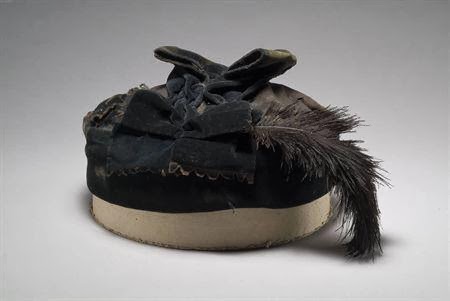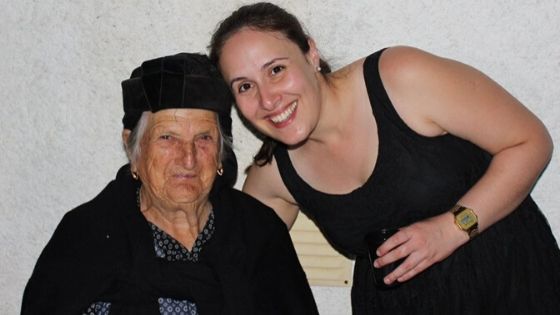Ti Amélia: 98 years of history under the Gandaresa hat
Ti Amélia: 98 years of history under the gandaresa hat.
In the photo with his great-granddaughter Cátia (34 years old) … at 96 years old.
Left’s us today – with his hat – the last Genuine Gandaresa …
More than 2 months ago “I feel that i need to” write the following text … coincidences …
Today it has gained more meaning and feelings of missing …
And like a simple tribute to a Lady who gave so much, to the others.
Here it goes … still written in the present.
Ti Amélia… “Ti” instead of “Tia”, that meas aunt, as we always treated older people here in Gândara.
I remember others who left us, in my childhood, who wore the complete traditional costume …
Ti Ester “of the eggs”, Ti Maria Bragança, Ti Ana Carriço …

“Gandara Woman’s Costume:
Work clothes were everyday clothes. Women wore headscarves, which protected them from the sun and bad weather. Sometimes, on top, they brought a small round black hat.
They wore long-sleeved blouses, which often closed behind.
This was all connected by a long band at the level of the hips (I lifted my skirts so as not to get them dirty).” Font here
Ti Amélia is the last of the gandaresas, who never gave up wearing their typical hat with a peacock feather … Bringing it alive and in function until the XXI century
My grandmother from Tocha and Ti Felismina from S. Caetano, also used it until they left … maybe that’s why my father (founder of Montalvo and Greenside), always said to Ti Amélia “You never stop wearing this hat !!” to which she replied smilling… “as long as I have my perfect mind, I will always use it”… and use … (used).
 Mother of 5 children, she planted and sowed everything needed for the pot and corn for the bread that still remained to sell, and for breeding chickens and later for the dairy cows, which made this, the dairy region par excellence.
Mother of 5 children, she planted and sowed everything needed for the pot and corn for the bread that still remained to sell, and for breeding chickens and later for the dairy cows, which made this, the dairy region par excellence.
“In Gandara neither Woman nor dairy cow !..”
My internship advisor, tipical urban from Lisbon ladie, but aware of the hardness of the field labor, said … seeing the constant hard work of women with the cows… transporting and working in the field and manual milking at home and later collective, in the morning early and late in the day; often already dark night … still having to get home and make the “supper” …
Invariavelmente “masturar” (mix) the dry beans, that she had left on the fire (fireplace) to cook with a piece of bacon, at lunchtime, with the vegetables of the season – most of the time cabbages and turnips but also green beans and peas. Luckily she had 2 daughters, who relieved hes homework, from them early age, making the traditional soup.
With all of this, Ti Amélia still found time, a smile and sympathy for the customers
from the grocery store and tavern, where she helped her husband, Ti Nocêncio (Inocêncio):
Ti Amélia “m’grandmother” sent me to fetch…
It is to register on the list… until my grandmother receives the milk money or sell the corn ”
And there I brought, in bags or cartridges of “recycled and absorbent gray” paper:
(always one thing at a time … we already practiced “zero waste”)
– 0.5 kg of yellow sugar
– 100g of coffee (mixture of roasted barley and chicory)
– A lot of blue and white or pink soap
– 1 liter of oil for the glass lamp, as electricity was a late achievement.
– A spoon of “powders” for the kitchen floor (aniline, to give the typical orange color, of the wooden plank floor, which was washed on Saturday… when one of the children was a girl)…
– A square of marmalade …
with luck, sometimes he got a candy…
The “faithful friend” codfish… even from the “smuggling” when it was rationed…
It was my mom or dad who bought it.
It was in the tavern of Ti Amélia and Ti Nocêncio already with the door closed, that despite sleep, and in the light of the oil lamp or petromax, with the smell of codfish mixed with the aroma of sugar and soap …
I heard serious conversations … whispered … in times of dictatorship …
Without me understanding why… there were two types of people:
1 – Those who said badly about my father and 2 or 3 more families …
because they wanted to make an elementary school and bring the electric “light”… and they stopped “talking” to us (saying good morning or good afternoon).
2 – And the others, most of the uncles and cousins, the family of Ti Antóino Carriço and their eleven children and of course our Ti Amélia and Ti Nocêncio, who not only gave up their tavern for “the conspiracy” necessary for “ go around ”to be able to bring a school to the Cavadas, which“ the boys ”of Corujeira would also enjoy, who in turn shared (and shared) the chapel of Santa Marinha…
As yet … Ti Amélia and Ti Nocêncio …
They provided a room for their store fixtures (tavern / grocery store), “at the huge time”,
for her to make a School !! … Provisional…
and also a small room in your patio, to make a toilet, for the school kids …
And in 1973-1974 ???, in my first class, I stopped needing to do (alone !!) the 5 km of bicycle that I did during half of the 1st academic year and, I was able to go to school on foot, and even go to lunch at home, instead of eating bread and butter.
And more… while in the first semester at the Lentisqueira school, we sang the National Anthem, standing up and all lined up…
At the new school, in Cavadas, we started to sing “Grândola vila morena”
Sitting in the desks, with their feet on the benches … (this part the parents didn’t know).
It was around this time that we started drinking school milk:
– Professor Teresa, who came from the wasp from Cantanhede, always with socks full of varnish (to hold the knits), brought the bags of milk of the day …
– In the middle of the morning and in the afternoon, the teacher would put the milk in the pot, heat it on a mini stove and with a soup ladle, distribute and fill our plastic mugs.
At the end we were all running to Ti Amélia’s patio, to wash the mugs with water and blue soap, at Ti Amélia’s manual “pump”.
In the intervals, we played in the “ring”, on the road… between two sharp curves with no visibility…
Inexplicably, there was never an accident …
(“The boy and the babe … put your hands under it”).
For almost four years, in which we ran wildly through the courtyard, to go to the toilet, or to wash our mugs or drink water at the pump … or to play on the sly and, of course, to make “mistakes” typical of our age…
I never saw Ti Amélia angry or “scolding” us… she always had a smile,
Even when she was almost run over by us, in her own home.
Today, I am the age she should be … I admire Patience and Generosity even more.
This is a text of recognition, homage and gratitude to a Great Woman Gandareza !!
Thank you Ti Amélia !!
You will stay with us forever and ever!!
Maria Dulce Martins






